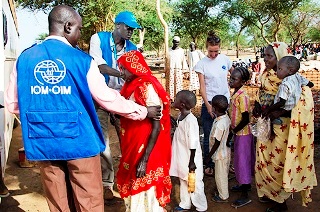IOM, WFP conduct data exchanges in South Sudan
June 30, 2019 (JUBA) – The International Organization for Migration (IOM) and World Food Programme (WFP) have completed the first functional data exchange between their beneficiary management systems to provide updated information on tens of thousands of people receiving assistance in Upper Nile and Jonglei regions.

Under an agreement signed in 2018, the two agencies reportedly share biometric data of individuals registered in each of their systems.
“The exercise aims to harmonize and synchronize the information in the two management systems to enhance efficiency in the delivery of assistance,” partly reads an IOM statement.
However, as part of the first phase of the data sharing arrangement, IOM and WFP have so far reportedly exchanged the data of more than 100,000 people in Upper Nile and Jonglei states.
“As part of WFP and IOM’s duty of care to people they serve, data privacy and protection is a fundamental part of the agreement. The use of data is overseen by a corporate data governance mechanism that provides rigorous safeguards to mitigate against risk of leakage and ensure data privacy,” said the agency.
“In line with industry standards, the cyber and data security framework follows UN rules on data privacy and human rights and is consistently upgraded as technology and systems advance,” it added.
The exercise, which involved upgrading both systems to ensure the inter-operability, compatibility and accuracy of beneficiary data to enable bulk data migration, will reduce reportedly duplication and cut down on redundant manual data collection.
“As humanitarian needs continue to rise in South Sudan, outstripping available resources, innovative approaches are urgently required to help us meet needs,” said WFP South Sudan director, Ronald Sibanda.
“The data sharing initiative with IOM will not only help us provide assistance better by cutting duplication and redundant processes but helps us track population movements in case of further displacement,” he added.
Meanwhile, through its Displacement Tracking Matrix (DTM), IOM says it conducts registration, biometric and non-biometric, at the request of governments or other humanitarian partners to support the targeting and delivery of humanitarian assistance and services.
“The successful development of interoperability between SCOPE and BRaVe for data exchange of beneficiary information is a remarkable achievement in harmonizing beneficiaries’ personnel data management and improving the efficiency of aid delivery for humanitarian response since WFP is the largest food assistance provider and IOM is the key data provider through the DTM programmes,” said IOM’s Chief of Mission, Jean-Philippe Chauzy.
IOM and WFP plan to have exchanged data for more than 700,000 people across the world’s youngest nation by late 2019.
(ST)
